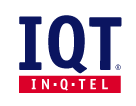
A semi-mysterious entity has made some investments into 3D printing startups on behalf of the US intelligence community.
The entity we speak of is “In-Q-Tel”, an awkwardly-named non profit company whose mission is this:
Launched in 1999 as an independent, not-for-profit organization, In-Q-Tel (IQT) was created to bridge the gap between the technology needs of the U.S. Intelligence Community (IC) and emerging commercial innovation. We identify and invest in venture-backed startups developing technologies that will provide “ready-soon innovation” (within 36 months) vital to the IC mission. These technology startups are traditionally outside the reach of the IC; in fact, more than 70 percent of the companies that IQT invests in have never before done business with the government.
Recently In-Q-Tel has dropped cash on two fascinating 3D printing startups: Fuel3D, a developer of 3D scanning technology and Voxel8, designers of a way to 3D print embedded electronic circuits into prints. In the past they’ve also delved into 3D technology by investing in KeyHole, which eventually became Google Earth 3D.
In-Q-Tel is, according to Wikipedia:
A not-for-profit venture capital firm that invests in high-tech companies for the sole purpose of keeping the Central Intelligence Agency, and other intelligence agencies, equipped with the latest in information technology in support of United States intelligence capability.
It’s a way for the intelligence community to pool their resources and apply them in a consistent manner to gain benefits from the exploding startup community. For startup companies, it’s a way to be funded by the intelligence groups without being directly associated with them – and receive some very valuable cash.
Apparently both Fuel3D and Voxel8 are seen by the CIA as potentially useful technologies for their activities. One can easily imagine Fuel3D’s expertise in facial scanning to be of primary interest to the Agency, as such technology could potentially improve their ability to track individuals of interest.
But what about Voxel8? Their technology involves the ability to 3D print an object made from plastic, but which has embedded electrical circuits. For example: Print a quadcopter, drop in the motors and controller chip and it’s good to go. It seems that in the future, 007’s need only have a printer handy to print their specialty equipment.
One can only imagine the interesting scenarios made possible for the intelligence community with tech from Voxel8 and Fuel3D.
Via In-Q-Tel

